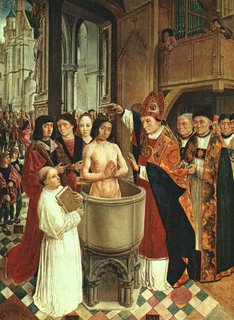Clovis

By the time Clovis acceded to the leadership of the Franks, the Roman Empire was in a shambles: puppet emperors had been under the control of the Suevians since 456, but the Suevian power-broker Ricimer had died in 472, and the last person to hold the title of Roman emperor, the 16-year old boy Romulus Augustus, abdicated in 476. While Clovis' father Childeric still had to contend with stray Roman armies, by 481 these armies were little more than lost patrols. Clovis took the opportunity to drive the Romans out in 486, defeating (and decapitating) Syragius, the son and successor of the Roman governor of Gaul, Aegidius, and the model for the Arthurian romance Sir Sagramore the Foolish. After defeating Syragius, Clovis began to plan his conquest of the other "barbarians" along the Rhine.
He chose as his wife Clotilda, a devout Catholic and the orphaned daughter of a brother of the Burgundian king Gontebaud; Gregory of Tours later suggested that Clovis's choice of spouse was meant to unnerve Gontebaud, who had supposedly murdered Clotilda's father. In any event, Clotilda had attempted to convert the pagan Clovis at the time of their marriage, but it wasn't until Clovis found himself having trouble with the Alemanns that Clovis relented. He vowed to become a Christian if he defeated the Alemanns; and after he defeated them, he received baptism amid great pomp and circumstance from St. Remigius on Christmas Eve, 496 -- becoming the first Christian king of the Franks and enjoying the cooperation of the Church thereafter.
Conspiracy theorists suggest that Clovis' baptism was actually the consummation of a bargain struck by the Roman Catholic Church -- that in exchange for the Church's support in temporal affairs, Clovis and his progeny would renounce the Merovingian claim that the family line began with the union of Jesus Christ and Mary Magdalen. If conspiracy theories about Roswell, Marilyn, Kennedy and Elvis have got you scratching your head, imagine what motivates a modern mind to hatch a conspiracy theory focusing on the baptism of a Frankish king from the 5th century. Today's Merovingian partisans mourn the reign of the independent-minded Dagobert II (676-9) as the last true Merovingian king under the bargain, and regard the papally-supported Carolingian coup which relegated Merovingian figurehead Childeric the Lazy to a monastery in 751 as the last semi-bloody deed in the silencing of the radical Christianity of Jesus' half-brother, James the Just; on the other side of the coin, the anti-Merovingians claim that the Merovingians went underground through organizations such as the Knights Templar and are at present the unseen powers behind international industry and finance.
Clovis subsequently took on and defeated Clotilda's uncle, Gontebaud, king of the Burgundians and one of the last sponsors of the Roman emperors, in 500, and went after the Visigoths, killing Alaric II, king of the Visigoths, at Toulouse in 507 -- thereby extending the Frankish kingdom to include much of modern France and Germany. He established his court at Paris, thereby establishing the city as the preferred capital of Gaul (or France) for centuries, where he promulgated the earliest Frankish canon of written laws and meddled poorly in church affairs. According to custom, when Clovis died (on this date in 511 in Paris at the age of about 46) his kingdom was split among his four sons, two of whom (Childebert I and Chlotar I) emerged as dominant kings of the Frankish realm for a time.
Labels: Christian History, France, Kings and Queens, Pop Culture





0 Comments:
Post a Comment
Subscribe to Post Comments [Atom]
<< Home